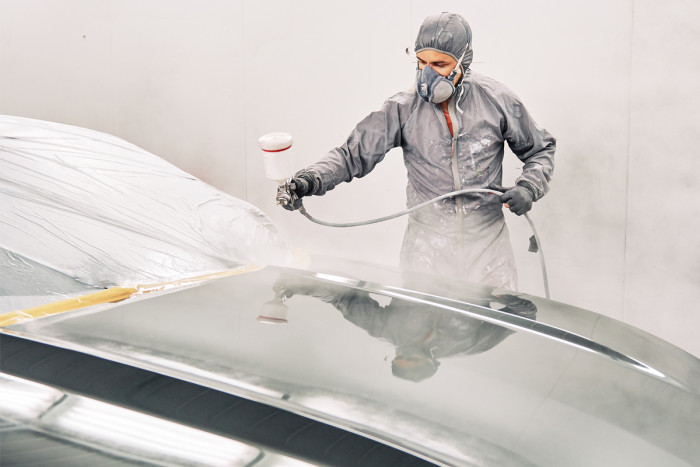Automotive Refinisher
Kaipeita Waka
Alternative titles for this job
Automotive refinishers prepare vehicle surfaces, match and mix colours, and apply paint to vehicles.
Pay
Automotive refinishers with up to five years' experience usually earn
$24-$28 per hour
Automotive refinishers with over five years' experience usually earn
$28-$38 per hour
Source: Collision Repair Assn, Automotive Employment NZ and OneStaff, 2021.
Job opportunities
Pay
Pay for automotive refinishers varies depending on qualifications and experience.
- Apprentice automotive refinishers can expect to earn the minimum wage or a little more.
- After one to five years they usually earn up to $28 an hour.
- Automotive refinishers with more than five years' experience can earn between $28 and $38 an hour.
- Self-employed automotive refinishers and those in roles with more responsibility or skill can earn more than this.
Source: Collision Repair Association, 2021; Automotive Employment NZ, 'Motor Body Staff', May 2020; and OneStaff, 'What's My Rate? New Zealand Industrial and Trades Wages Report - 2021', 2021.
- PAYE.net.nz website - use this calculator to convert pay and salary information
- Employment New Zealand website - information about minimum wage rates
(This information is a guide only. Find out more about the sources of our pay information)
What you will do
Automotive refinishers may do some or all of the following:
- discuss vehicle-painting options with customers or managers
- sand vehicles to prepare for painting
- select and mix paints
- apply paint
- buff and polish finished paintwork.
Skills and knowledge
Automotive refinishers need to have knowledge of:
- how to prepare a vehicle for painting
- vehicle painting techniques
- different paint types and colours and how to apply them correctly
- colour-matching and spray-painting.
Automotive refinishers who run their own business need small business skills.
Working conditions
Automotive refinishers:
- usually work regular business hours
- work in collision repair (paint and panel) workshops and in vehicle paint shops
- work in conditions that may be noisy and fumy, so they need to use protective equipment.
Entry requirements
There are no specific requirements to become an automotive refinisher. However, a New Zealand Certificate in Automotive Refinishing may be useful.
To become a qualified automotive refinisher you need to complete an apprenticeship and gain one or both of:
- New Zealand Certificate in Collision Repair and Automotive Refinishing (Level 3)
- New Zealand Certificate in Automotive Refinishing (Level 4).
MITO oversees automotive refinisher apprenticeships.
- MITO website - information about New Zealand Certificates in Automotive Refinishing
- More information about apprenticeships
Secondary education
No specific secondary education is required for this job, but construction and mechanical technologies and maths to at least NCEA Level 1 are useful.
For Year 11 to 13 learners, trades academies, and the StartUp, STAR and Gateway programmes are good ways to gain relevant experience and skills.
These programmes may help you gain an apprenticeship, but do not reduce the amount of time it takes to complete it.
Personal requirements
Automotive refinishers need to be:
- punctual, motivated, responsible and honest
- careful, patient and accurate, with an eye for detail
- able to follow instructions and ask questions
- able to work independently and as part of a team
- good at problem solving.
Useful experience
Useful experience includes:
- experience with vehicles or driving
- working in an automotive workshop or in panelbeating
- work as a signwriter or industrial spray painter.
Physical requirements
Automotive refinishers need to have:
- good hand-eye co-ordination
- normal colour vision for matching colours
- no breathing problems or dermatitis as they work with harmful chemicals.
Find out more about training
- MITO
- 0800 88 21 21 - info@mito.org.nz - www.mito.org.nz
What are the chances of getting a job?
Shortage of automotive refinishers
Automotive refinishers are in high demand due to an increase in car ownership rates, which means more demand for automotive refinishing services.
However, not enough people are completing apprenticeships in automotive refinishing to meet demand.
As a result, vehicle painter (automotive refinisher) will appear on Immigration New Zealand's Green List from March 2024. This means the Government is actively encouraging these skilled workers from overseas to work in New Zealand.
According to the Census, 1,842 automotive refinishers worked in New Zealand in 2018.
Types of employers varied
Most automotive refinishers work for:
- specialised collision repair businesses and car painters
- general automotive workshops that deal with cars, boats and trucks
- motor vehicle dealerships.
A small number of automotive refinishers are self-employed.
Sources
- Automotive Employment NZ website, accessed March 2021, (www.automotiveemployment.co.nz).
- Immigration New Zealand, 'Changes to Immigration Settings Announced, '23 September 2023 (www.immigration.govt.nz).
- Motor Industry Association, 'January 2021 New Vehicle Registrations Show a Good Rate of Recovery' (media release), 2 February 2021.
- Motor Industry Association website, accessed March 2021, (www.mia.org.nz).
- O’Carroll, D, 'The Comeback Continues: The Best February Ever for New Vehicle Registrations' 3 March 2021, (www.stuff.co.nz).
- OneStaff, 'What's My Rate? New Zealand Industrial and Trades Wages Report – 2021', March 2021, (www.onestaff.co.nz).
- Pritchard, N, general manager, Collision Repair Association, careers.govt.nz interview, March 2021.
- Stats NZ, '2018 Census Data', 2019.
(This information is a guide only. Find out more about the sources of our job opportunities information)
Progression and specialisations
Automotive refinishers may progress to set up their own automotive refinishing business.
Last updated 24 March 2025


